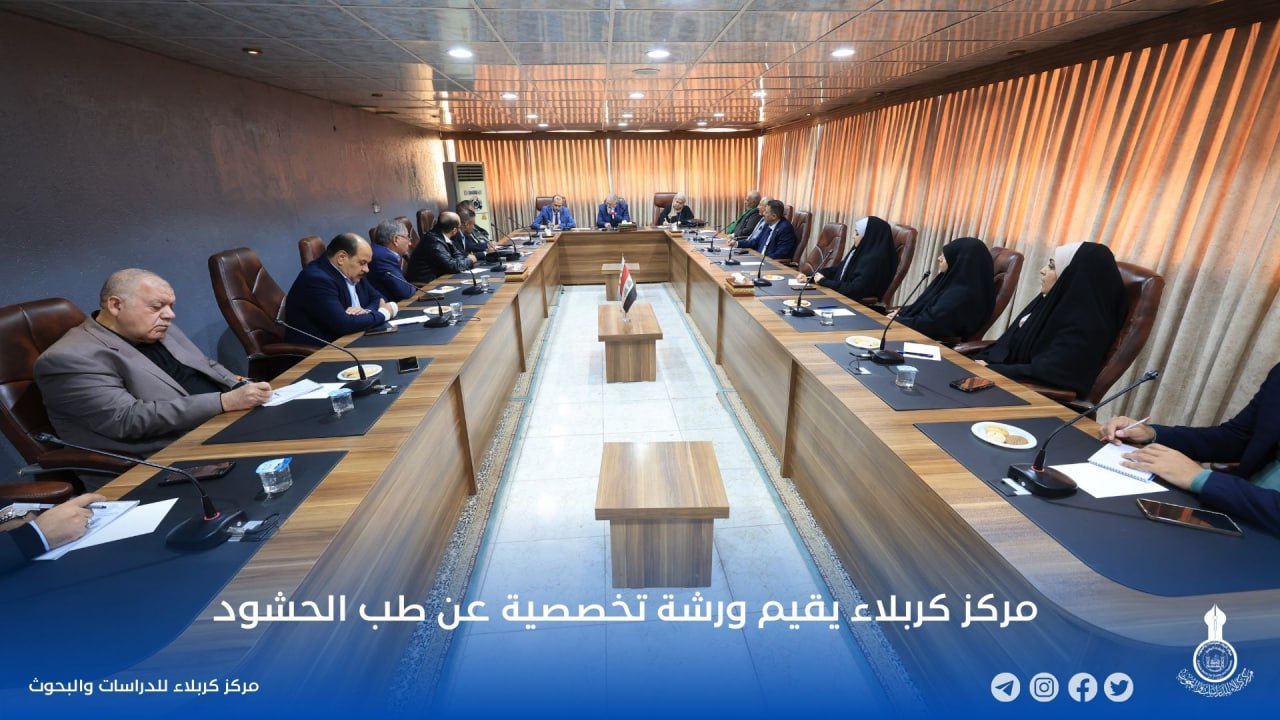The Arbain is one of the largest human gatherings in the world, with millions of visitors from different parts of Iraq and countries of the world flocking to the city of Karbala in Iraq, and this annual event witnesses a huge influx of people of multiple nationalities and cultures, posing significant challenges at the level of infrastructure, security, and healthcare. In this context, the management of mass gathering medicine is one of the core issues that require the attention of the concerned authorities, as this event requires the provision of effective health care and resources. Medical is sufficient to handle large numbers of visitors, who may face a range of health challenges, whether as a result of fatigue, accidents, or infectious diseases.
The workshop began with an opening speech from Mr. Abdul Amir Al-Quraishi, Director of the Karbala Center for Studies and Research, where he welcomed the attendees and pointed to the importance of this workshop in improving the level of health and medical services during the next Arbain, and discussing the challenges that arose during the last Zyarah, and stressed the need for concerted efforts between all concerned parties, including the holy shrines, the Ministry of Health, the Red Crescent, and official and service departments in order to ensure the provision of the best medical services to visitors. He also pointed out that the center attaches great importance to conferences and academic workshops in this field, and that this meeting is an important step towards improving coordination and exchange of experiences between the various parties concerned, and also stressed the importance of focusing on the challenges facing the services of mass gathering medicine in the Arbain, such as the unbalanced distribution of medical detachments and the difficulty of transportation, and that appropriate solutions to these problems require prior preparation and careful implementation of logistical plans. He also explained that coordination between the parties concerned must include all health and administrative aspects to ensure a rapid and effective response during the Zyarah.
Dr. Alaa Abdul Rahman Habib, Director of the Mass Gathering Medicine Center at the Health and Education Authority, highlighted the importance of effective coordination between the various entities participating in the fortieth visit to ensure the success of the medical services provided. He stressed the need to complete the advance planning of crowd medicine services, with a focus on training medical staff and volunteers in the fields of first aid and cardiopulmonary resuscitation, and pointed to the importance of developing health transport mechanisms and coordination between medical teams to avoid congestion within the Old City. Dr. Habib explained that a number of researches have been presented during the past year on crowd health and medicine, with the aim of identifying the strengths and weaknesses of current operations, as well as to identify the actual and qualitative needs of human resources, devices, tools, and medicines. He added that the results of this research will be discussed at upcoming medical conferences, including the ninth international scientific conference for the Zyarah of the forty held by the Karbala Research Center, with the aim of enhancing future preparation and improving the response of the health system during the Arbain pilgrimage.
In preparation for the Arbain, he pointed out that treatment protocols have been developed for common diseases that may appear during the million visits, while determining how to deal with each case quickly and effectively, to ensure the provision of high-quality health care in the face of major health challenges. Mr. Adnan Jawad, Director of Operations of the Karbala Branch of the Red Crescent Society, reviewed the efforts made to distribute medical detachments and coordinate operations with the holy shrines. However, there are some objections by some parties about the distribution of detachments in some locations.
Challenges in Crowd Medicine Management during the Arbain pilgrimage
First: - Organizational challenges
Second: - Health challenges
Third: - Human challenges
Fourth: - Technical challenges
Fifth: - Challenges related to medical resources
Sixth: - Security and organizational challenges
Seventh: Environmental and climate challenges
Recommendations
1.The need to plan and organize the distribution of medical detachments in a balanced manner to reduce congestion in some places, thus contributing to facilitating access to medical care without disrupting the movement of visitors.
2.Cooperation with the Husseiniya Processions Authority and the Karbala Police should be made to regulate transport routes and provide special corridors for medical transport, in order to facilitate the arrival of ambulances and medical detachments to crowded places quickly and effectively.
3. Strengthening coordination between the Holy Shrines, the Ministry of Health, and the Red Crescent to ensure a rapid and effective response to emergencies and to organize medical services perfectly during the pilgrimge.
4.Providing more ambulances and medical detachments in places with a high density of visitors, while ensuring that they are distributed strategically to cover all areas in an integrated manner.
5. The need to develop a comprehensive emergency plan months before the visit to ensure coordination of all medical and logistical aspects between the concerned authorities, which helps in organizing operations more efficiently.
6. Continuing the training of medical staff and volunteers on first aid and cardiopulmonary resuscitation, to ensure their readiness to deal with emergency cases effectively ...
7. The need to enhance coordination between the concerned departments and authorities to better organize crowd medicine, which contributes to improving the provision of medical services.
8.Finding solutions for medical waste to dispose of medical waste to ensure safe and healthy waste management during the Zyarah period.

